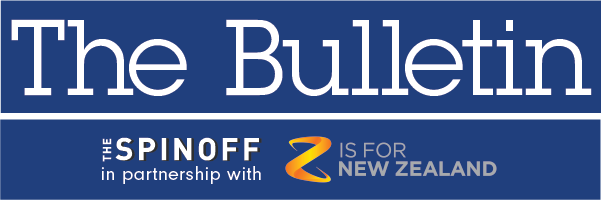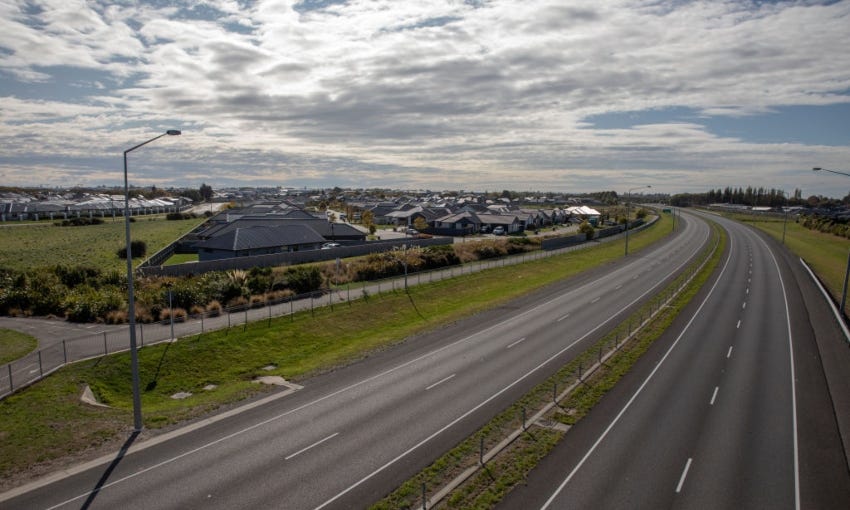
Good morning and welcome to The Bulletin for Tuesday 28 April, by Alex Braae for The Spinoff. Presented in partnership with Z Energy.
In today’s edition: What it means now that we’re at level three, contact tracing app on the way, and Vic students in halls protest resumption of fees.

Image: A deserted Southern motorway in Christchurch (Getty Images)
Well, we made it. The first – and hopefully only – stint of level four restrictions has come to an end, and as of this moment we are at level three. And in a pretty remarkable turn of events, the level four stint lasted only slightly longer than was initially set out, which is a pretty big indicator of success – the other important data being the long run of days in which the new case numbers have gone up by single digits. As Siouxsie Wiles and Toby Morris put it, "we broke the chains of transmission and likely saved thousands and thousands of lives." However, they say that level three "may be the trickiest phase yet", as there could still be "smouldering ashes" of Covid-19 out there, and they could still start a new fire.
Some things will change, but many aspects of life will remain the same at level three. The crucial point is that bubbles will still exist as a concept, and people are required to remain within their bubbles. Slight additions to bubbles are allowed – for example, a family might add a parent who lives alone to help with childcare. But in general terms you are still not meant to see people from outside of your bubble. All this and more is explained in the exhaustive question and answer post written by The Spinoff's Toby Manhire.
Hundreds of thousands of people will also be going back to work today, though those who can work from home will still be doing so. That means that the roads are expected to be busier than the placid state they've been in for the last month. Increased traffic will bring with it some pressures, such as a higher likelihood of car crashes. The road toll has been at the lowest level in decades recently, and hospitals have reported dramatically lower rates of patients coming in with serious injuries. The move to level three will also mean many more food outlets will be open – the NZ Herald reports that in the six hours or so of level three so far, the Maccas drive-thru window has already been doing a roaring trade. But businesses are also being warned that the rush of orders that they see in the coming days may not last – after all, we're still heading into a severe economic downturn.
It will also mean a lot of major construction projects will resume. For example in the Nelson region, Stuff reports that the Waimea Dam project will start up again. In Auckland, it'll be the City Rail Link. Newshub reports that dozens of state highway and provincial growth fund projects will resume. The infrastructure projects picking up from where they left off is seen as a key part of the economic recovery, because they'll get money flowing through again.
PM Jacinda Ardern has urged continued vigilance and observance of the rules. However, as Stuff reports, she says that if this phase is successful, we might not need to be in level three for a particularly long time. The current schedule has two weeks locked in, with further extensions possible. Moving out of level three won't necessarily require there to be absolutely no new cases – rather, it will be about maintaining the spread of cases to a small enough number, so that health authorities can keep on top of them.
Finally, if you are going to take advantage of takeaways coming back this evening, some recommendations: Alice Neville and Jean Tang have rounded up a country's worth of great food outlets that will be turning on the ovens. It's going to be a really challenging time for many small businesses starting up again, and this intermediate period between closure and full reopening will be crucial.
Just quickly, a message from our editor Toby Manhire:
"Here at The Spinoff, members’ support is more important than ever as the Covid-19 crisis lays waste to large chunks of our commercial work. It's a tight time for everyone, of course, but if you’re able to, please consider joining Spinoff Members to help us stay afloat and keep producing work by the likes of Siouxsie Wiles and Toby Morris, whose collaborations have had a real impact in New Zealand and around the world."
A voluntary contact tracing app is set to be unveiled in the next fortnight, reports Radio NZ. Privacy and technology experts have been quoted in the story, and a key theme is that people will need to be ensured that any data they entrust to it isn't misused. The importance of contact tracing is hard to overstate as we leave level four, and as this piece quoting Dr Ayesha Verrall from the start of the month noted, an app will allow much more automation of the process. Of course, if you don't have the ability to get the app, keeping track of your movements will be very important.
Students in Victoria University halls are being charged rent again from this week, despite many not being able to stay in them. A Salient team reported on a range of responses, but this one stood out – a Weir resident said they were being "forced to choose between paying hundreds of dollars rent for a room I'm not legally allowed to enter, or drop out of university.” Some discounts have been offered, but just for context on this – students say they also had to leave their rooms at very short notice, when the country went into lockdown. Radio NZ reports this morning that a group advocating for a rent strike has been growing rapidly.
The legal basis for the lockdown is being questioned by academics, who say legislative work is needed to tighten up how emergencies are managed. Writing on The Spinoff, law professors Andrew Geddis and Claudia Geiringer argue that the underlying law of the lockdown (the Health Act 1956) is not fit for purpose. "It would be far better if the lockdown rules were based on clear and express parliamentary approval that leaves no doubt at all about their status."
Speaking of enforcing the lockdown, it has been a busy weekend for the cops trying to enforce it, with almost 100 prosecutions. And Stuff's Marlborough editor Ian Allen wrote an entertaining piece about the region's strangest excuses for not following it – including one remarkable case of a possum hunter who went into the bush well before it started, and came out not even knowing what a coronavirus was.
The government is touting progress made on flu vaccinations this year, after criticism of the handling of the early rollout from the health sector. Radio NZ reports that twice as many people have now been vaccinated compared to this time last year, and there are still around 700,000 doses available. Priority vaccination for at-risk groups has now ended, and the government wants essential workers to be next in line for a dose.
One of the best reads of the weekend's papers didn't have a single byline on it, rather it was put together by reporters all over the country. The Sunday Star-Times profiled seven spots away from the main centres, to get a bit more detail on how the lockdown had affected their particular patch. One of the really interesting places was Taihape, which before Covid-19 had close to full employment. They'll be a place to keep watching over the coming months to get a sense of whether a strong food production base can be built on by other sectors. Speaking of which, meat processing is expected to return to close to normal levels this week, reports Farmers Weekly, which will be a huge relief for farmers still facing drought pressures. And for a look at a tourist destination where people are enjoying the sudden serenity, read Michael Andrew's piece about lockdown at Lake Tekapo.
This is an extremely process-heavy sort of story, but it touches on something extremely important about the accountability of how our country is governed. Newsroom's Sam Sachdeva reports that public servants pitched the idea of suspending the Official Information Act during the lockdown period – a suggestion which forced the Chief Ombudsman Peter Boshier to intervene and block it. Even in the stagnant and unwelcoming form that the OIA currently exists in, such a move would have been disastrous for public accountability, and in my view, one of the things this crisis has revealed is the importance of accountability in improving the competence of the government's response. There is also an allegation in the story from National, who say the health minister's office ignored an OIA request – that has been denied by the government.
Got some feedback about The Bulletin, or anything in the news?
Drop us a line at thebulletin@thespinoff.co.nz

Right now in the towering pile of great reads on The Spinoff: Erin Kavanagh-Hall looks at a range of neurodivergent experiences during lockdown. Dr Claire Charters (Te Arawa) writes about Te Tiriti during the Covid-19 pandemic, Aotearoa’s dual legal systems, and the government’s obligations to both in these uncertain times. Chris Farrelly of the Auckland City Mission urges people to take note of how tough things are getting for food banks. Danyl Mclauchlan muses on national identity, and how this all will change how we see ourselves. Peter McKenzie reports on how drug dealers are operating their businesses since the lockdown started. Elizabeth Heritage writes about the recent resurgence of fat activism. Teuila Fuatai writes about how Dilworth School is responding to the current situation. Elly Strang pays a visit to the Auckland Museum – well, the virtual version at least. Author Nicky Pelligrino responds to a recent article about e-books and libraries, giving the perspective of those trying to get by on their writing.
For a few other pieces of great writing from the weekend: Calum Henderson has picked the ten most exciting Zoom backdrops for MPs at the ERC. Madeleine Chapman has put down another definitive ruling – she has ranked 142 biscuits that are available in New Zealand, from worst to best. And Paul Ward has a remarkable essay about the voice of science through these eras in which a lot of history happens.
One of the most interesting – and potentially misunderstood – stories of the last week was the oil futures price going negative. On the surface, it looked bizarre and impossible to explain, but it wasn't quite as simple as the headlines might have made it seem. For a feature today, Business Desk's (paywalled) Brian Gaynor has done a very useful job of outlining what exactly happened, and what the significance is for the wider market. Here's an excerpt:
Futures are contracts that allow investors and industry participants to agree to buy or sell financial products or commodities at a fixed price on a specific future date. Thus, if an investor acquires a contract to buy WTI crude oil at US$40 a barrel in two months and the contract price is US$45 a barrel on that date, then the investor effectively makes a profit. Crude oil producers and users buy and sell futures contracts to reduce the risk of major price movements but speculators also invest in them to make money.
An important characteristic of WTI futures is that they require physical delivery. In other words, contract holders must either deliver or take delivery of crude oil on the expiry date. The delivery point for WTI futures is Cushing, Oklahoma. The problem with this is Cushing’s storage tanks are full to the brim at present with the town’s total crude oil inventory surging from 38.4 million barrels in mid-March, to 49.2 million barrels at the beginning of this month and 59.7 million barrels last week.
When sporting competitions start up again in the coming months, keep an eye out for those still on hold. This piece from ABC News looks at Australia's four biggest women's football codes, and the starkly different prospects facing each of them. And for the administrators of these games and many more, the revenue crunch of their Covid-blighted seasons will put their commitment to women's sport to a stern test. A major setback now could halt a generation of progress towards more inclusion.
That's it for The Bulletin. If you want to support the work we do at The Spinoff, please check out our membership programme.




